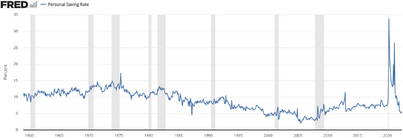Saving facts for kids

Saving means keeping money instead of spending it right away. It's like putting aside some of your income for later. This also involves finding ways to spend less money on things you buy regularly.
You can save money in many ways. For example, you might put it in a deposit account at a bank. Other ways include a pension plan, an investment fund, or simply keeping cash at home. When we talk about saving in your own personal finance, it usually means keeping money safe with low risk. This is different from investment, which often involves higher risks. Saving money does not always mean it will earn extra money like interest.
It's important to know the difference between saving and savings. Saving is the action of not spending your money or other valuable things. Savings refers to the money or assets you have already put aside. So, saving is something you do over time, like a flow of water. Savings are the amount of water in the bucket at any moment. People often mix up these two words, even experts.
Sometimes, what counts as saving can be a bit different. For example, if you pay back part of a mortgage loan on a house, that money isn't spent on something you use right now. So, it's a form of saving. However, people don't always think of paying back a loan as saving.
Contents
Why Saving Matters
Saving is very important for the economy. When people save money, it provides funds for investment. Instead of buying consumer goods, that money can be used to build new factories or buy machines. This is called creating fixed capital. More fixed capital helps the economy grow.
However, just saving more money doesn't always mean more investment. If saved money isn't put into a bank or another financial place, businesses can't borrow it. This means the savings might not help the economy grow. It could even lead to less demand for goods and a recession. If people save less than businesses want to invest, it can cause a short-term economic boom. But in the long run, it can slow down future growth.
Imagine a farmer who saves some of their best corn harvest. They keep it as seed for the next planting season. If they ate all the corn, they wouldn't have seeds for next year. Saving the seeds helps them grow more food in the future.
Interest Rates and Saving
In the past, some economists thought that interest rates would naturally balance saving and investment. They believed if people saved more, interest rates would fall. This would encourage businesses to invest more, keeping things balanced.
But another famous economist, John Maynard Keynes, had a different idea. He thought that saving and investment don't always change much when interest rates move. He also believed that the amount of money available affects interest rates in the short term. This means that saving could be higher than investment for a while. This could lead to too many goods and a recession.
Saving Your Own Money
When we talk about your own personal finance, saving usually means keeping your money safe for future use. You might use a deposit account at a bank that pays a little interest. This money can be for emergencies, to buy something big like a car or house, or for future needs like college.
If you use money to buy stocks or put it into an investment fund, that's usually called an investment. This is because there's a risk you could lose some of your money. Cash savings accounts are considered very safe. In the United States, banks have deposit insurance from the Federal Deposit Insurance Corporation (FDIC). This insurance protects your money if the bank fails. This protection helps prevent big problems like those seen during the Great Depression.
Sometimes, the words saving and investment are used to mean the same thing. For example, banks might call a savings account an "investment account" to make it sound more appealing. A good rule to remember is: if your money is kept as cash, it's usually savings. If you buy something hoping it will grow in value, but its price can go up and down, that's an investment.
Saving in Economics
In the world of economics, saving is defined as the money you have left after paying taxes and buying things you need. This is your after-tax income minus your consumption. The part of your income that you save is called the average propensity to save. The part of any extra income you save is called the marginal propensity to save. The amount of money people save can be affected by the general level of interest rates.
See also
 In Spanish: Ahorro para niños
In Spanish: Ahorro para niños
- Capital accumulation
- Dissaving
- Financial literacy
- Frugality
- Greed
- Prudence in economics
- Saving identity
- Savings account
 | Kyle Baker |
 | Joseph Yoakum |
 | Laura Wheeler Waring |
 | Henry Ossawa Tanner |

